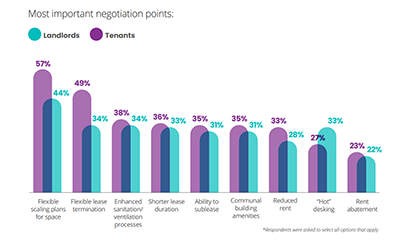
Tenants Committing to Longer Leases

Chart credit: Visual Lease
Commercial real estate tenants are ready to commit to longer lease terms, reported software firm Visual Lease, Woodbridge, N.J.
Nearly 60 percent of tenants Visual Lease surveyed for its report, Commercial Real Estate in 2022: Outlook for an Industry in Recovery, are prioritizing leases of five or more years and nearly 20 percent are interested in 10 or more years of occupancy. The report noted 70 percent of tenants plan to expand their commercial real estate footprint in the year ahead.
On the other side of the ledger, 65 percent of landlords surveyed said they expect tenants will add space to their real estate portfolios in 2022.
Visual Lease forecasts an “urban revival” based on its survey, noting 78 percent of landlords think the greatest demand for leased properties in 2022 will appear in cities. “Tier-one cities like Los Angeles and New York are anticipated to draw the biggest crowd, signaling a revival for major metropolitan areas that were previously hard-hit during the onset of the pandemic,” the report said.
Though 75 percent of landlords and 61 percent of tenants said they expect 2022 commercial rent prices to be about the same or higher than before the pandemic, a rent increase could create some challenges as nearly two-thirds of tenants admitted their organization fell behind on rent during the pandemic and 37 percent remain behind on rent.
Every landlord surveyed reported their tenants had requested modifications to their leases mid-term in response to COVID-19. As a result, 99 percent of landlords have revised their agreements to better accommodate existing and future tenants, including changes to building rules and regulations (57 percent), operating expenses (54 percent) and indemnification and insurance (45 percent), as well as sublet/assignment rights, rent abatement and force majeure clauses.
“Based on what they learned from managing their businesses during COVID-19, tenants note that the following will be important considerations when negotiating future leases: flexible scaling plans for space, flexible lease termination, shorter lease duration and an ability to sublease, among others,” the report said.
